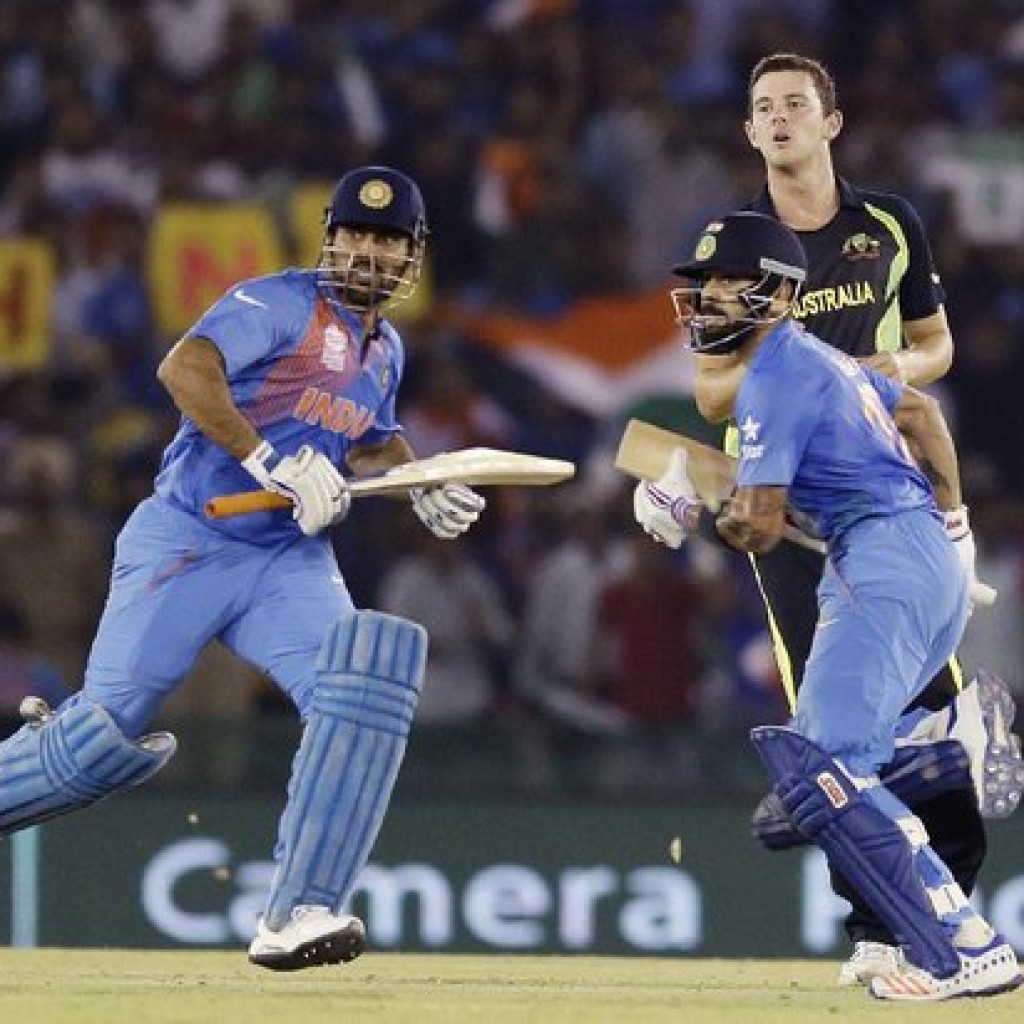Magnificent Kohli Powers India Into Semi-Finals

Australian challenge fizzles out in the face of Indian champion’s masterful unbeaten 82 in 51 balls
India and Australia played out another epic in a rivalry that is gradually becoming one of the more fabled ones in the cricketing world. This contest, with a semi-final spot in the ICC World Twenty20 2016 at stake, was settled entirely by the incandescence of Virat Kohli, who added another chapter in his rapidly burgeoning masterclass of chases, at a vibrant PCA Stadium.
A capacity Sunday (March 27) crowd was on tenterhooks for much of India’s chase of Australia’s 160 for 6, built primarily on a sparkling opening stand between Usman Khawaja and Aaron Finch, though with Kohli in the middle, hope always sprang eternal. The India No. 3 did not disappoint, unfurling an innings of such magnificence, beauty and orthodoxy that he left even the Australians spellbound, and booked India a ticket to the March 31 semi-final at the Wankhede against West Indies.
Riding entirely on the back of Kohli’s undefeated 82 off just 51 deliveries with nine beautifully-timed fours and two towering sixes, India eventually won in a canter, by six wickets with five deliveries to spare. Mahendra Singh Dhoni, who saw another crucial toss slip away as Steven Smith called right, landed the customary winning blow by spanking James Faulkner wide of mid-on as India hurtled to 161 for 4, but it was the Test captain who walked away with all the accolades.
Kohli is an excitable young man, so how he manages to control his emotions every time the ball is delivered is astonishing. In a wonderful display of awareness and spectacular shot making on a difficult surface once the ball lost its hardness, Kohli accelerated in dramatic style. His half-century, almost regulation in a chase, came off 39 deliveries, but he only took 12 more for the last 32 runs, smashing six fours and one six in that period to completely dominate the unfinished fifth-wicket stand of 67 off just 31 deliveries. Dhoni’s contribution to the stand was 18 – need one say more?
India came into the last five overs of its innings needing 59, having suffered another top-order disappointment as Shikhar Dhawan, Rohit Sharma and Suresh Raina all fell with just 49 on the board. Kohli had warmed up with a whip through mid-wicket and a drive on the up off successive deliveries, but was forced to rein himself in as the wickets tumbled around him.
Yuvraj Singh, who had bowled a tidy three overs, huffed and puffed to 21 but hung around long enough to add 45 for the fourth wicket with Kohli before being smartly caught by Shane Watson in what eventually became the Australian’s final international appearance. All eyes were on Dhoni, and how he would approach the situation. The captain ran furiously, ticked the strike over and then watched as awestruck as anyone else as Kohli lay into Josh Hazlewood, Nathan Coulter-Nile and Faulkner with telling effect.
There were two screaming fours and a massive six in the 18th from Faulkner, which began with 39 needed. In the next six balls, the equation came down to 20 off 12. Coulter-Nile was hammered for four fours in the 19th over, and Dhoni then sealed the deal. Australia, well on course for large periods, will wonder how this one got away, but this was a match won fair and square by the Indians, not lost by their opponent.
Earlier, until Ashish Nehra forced Khawaja to drive at a gentle awayswinger and nick to Dhoni, India was on a hiding to nothing. Khawaja set stall with the very first ball of the evening, pulling Nehra through square-leg, though the experienced left-arm paceman got his own back with five successive dots.
Clearly, Khawaja was going to take the fight to India when the ball was hard and new, just about the only time when fluent timing could be guaranteed. Jasprit Bumrah’s second over triggered an avalanche of boundaries with Khawaja the primary enforcer and Finch only marginally behind. Bowling a perfectly hittable length, Bumrah was taken apart by Khawaja much like he had been by Tamim Iqbal in Bangalore, going for four fours to immediately push India on to the back foot.
While Nehra held his own from the pavilion end, Dhoni was at a loss to staunch the flooding at the other. Each of Khawaja’s first six scoring strokes had been a four; feeling somewhat left out, Finch opened his broad shoulders to deposit R Ashwin twice over long-on in the off-spinner’s first over. A legside wide that flew to the fence contributed to 22 runs from that over so that Australia had clattered to 53 without loss after four overs.
Dhoni persisted with the parsimonious Nehra for a third over and the move paid off the dangerous Khawaja departed. It was to be a crucial passage; 54 had been realised by the openers in a mere 26 deliveries, with seven fours and two sixes. The next 15.4 overs produced the exact same number of fours and sixes and only 106 more runs as India wended its way back, the discipline in its bowling fusing beautifully with the slowing nature of the track which practically ruled out free-spirited strokeplay.
With Khawaja’s dismissal, the fluency disappeared a little even from Finch’s batting, while David Warner struggled during his brief stay until Ashwin shortened the length when he saw the batsman advancing, and gave the ball enough tweak to set up a simple stumping.
Energised by the twin strikes and lifted by a crowd that was now clearly throbbing, India jacked up the intensity. Dhoni, the master manipulator of resources and fields, pulled out a rabbit in the shape of Yuvraj, who responded with a wicket off his first ball of the tournament, Smith caught behind on the inside-edge.
India tightened the screws, striking at regular intervals to ensure it kept getting new batsmen out in the middle. Dhoni moved his bowlers like chess pieces, an over here, three overs there, Ashwin ignored with half his quota available and Ravindra Jadeja’s fourth left unutilised as he pinned faith in his faster bowlers. Nehra was impeccable, Bumrah rallied outstandingly well after that nightmare first over, Hardik Pandya held his own until the last two balls when Peter Nevill got stuck into him, and Yuvraj sent down three tidy overs.
All of this meant Australia never found any ballast in the last three-quarters of its essay. Beefy ball-strikes – local hero Glenn Maxwell who took 25 deliveries to hit his first boundary, Watson and Finisher Faulkner – all failed to come to terms with the surface, and India had reason to be optimistic at the break.
With Kohli on overdrive, the chase was reduced to a formality in the end. Simple as that.








